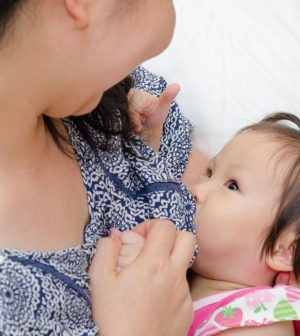- Could Your Grocery Store Meat Be Causing Recurring UTIs?
- Are You Making This Expensive Thermostat Error This Winter?
- Recognizing the Signs of Hypothyroidism
- 10 Strategies to Overcome Insomnia
- Could Artificial Sweeteners Be Aging the Brain Faster?
- Techniques for Soothing Your Nervous System
- Does the Water in Your House Smell Funny? Here’s Why
- Can a Daily Dose of Apple Cider Vinegar Actually Aid Weight Loss?
- 6 Health Beverages That Can Actually Spike Your Blood Sugar
- Treatment Options for Social Anxiety Disorder
Breastfeeding May Lower a Child’s Odds for Asthma

Breastfeeding may literally help your baby breathe more easily, according to new research that found the longer an infant is fed mother’s milk exclusively, the lower the baby’s chances of developing asthma.
“Breastfeeding for at least six months was the most protective but, importantly, it is likely that shorter amounts also provide some protection against asthma,” said study author Dr. Keadrea Wilson, an assistant professor of neonatology at the University of Tennessee Health Science Center in Memphis.
The American Academy of Pediatrics recommends exclusive breastfeeding for about six months, followed by continued breastfeeding as foods are introduced for one year or longer, due to the long list of potential health benefits associated with breastfeeding.
“In addition to nutrients, breastfeeding contains many factors that may influence how the lung and immune systems develop,” Wilson noted.
The study included more than 2,000 mother-child pairs from three studies. Women were asked about breastfeeding and any asthma symptoms when their kids were aged 4 to 6. The longer a mom exclusively breastfed, the less likely her child was to experience any asthma-related outcomes, including wheezing, asthma diagnosis, and/or use of medication to treat asthma in past one to two years.
Compared with babies who were breastfed for less than two months, those who were breastfed for two to four months decreased their odds by 36% of experiencing asthma or wheezing between the ages of 4 and 6. Babies who were breastfed for five to six months had a 39% lower odds of developing asthma, and those who breastfed for more than six months decreased their odds by 48%, the study found.
Breastfeeding combined with formula or juice did not provide the same asthma protection as exclusive breastfeeding.
The study was published online recently in the Annals of Allergy, Asthma, and Immunology.
Dr. Angela Hogan is vice chair of the American College of Allergy, Asthma and Immunology’s (ACAAI) Asthma Committee and a pediatric allergist and immunologist at Children’s Hospital of The King’s Daughters in Norfolk, Va. She reviewed the findings.
“In breast milk, there is a lot of good bacteria to colonize the gut and other protective proteins that keep the body’s immune system from revving up and becoming allergic and causing asthma,” she explained.
If you can’t breastfeed, there are other ways to help prevent asthma, including minimizing the use of antibiotics and taking steps to avoid viral infections such as keeping your newborn away from sick people and making sure to wash your hands often, Hogan said. Overuse of antibiotics can alter the gut microbiome and set the stage for asthma, she noted.
The ACAAI recommends that peanuts and eggs be introduced to babies at around 6 months of age to prevent peanut and egg allergies. This is not possible if a mom is exclusively breastfeeding for the first six months, she said.
Hogan’s best advice? “Talk to your pediatrician as there may be some infants at high risk for food allergies who should try peanut and eggs earlier.”
More information
Learn more about asthma in kids at the American College of Allergy, Asthma and Immunology.
SOURCES: Keadrea Wilson, MD, assistant professor, neonatology, University of Tennessee Health Science Center, Memphis; Angela Hogan, MD, pediatric allergist, immunologist, Children’s Hospital of The King’s Daughters, Norfolk, Va., and vice chair, ACAAI Asthma Committee; Annals of Allergy, Asthma and Immunology, May 9, 2022
Source: HealthDay
Copyright © 2026 HealthDay. All rights reserved.










